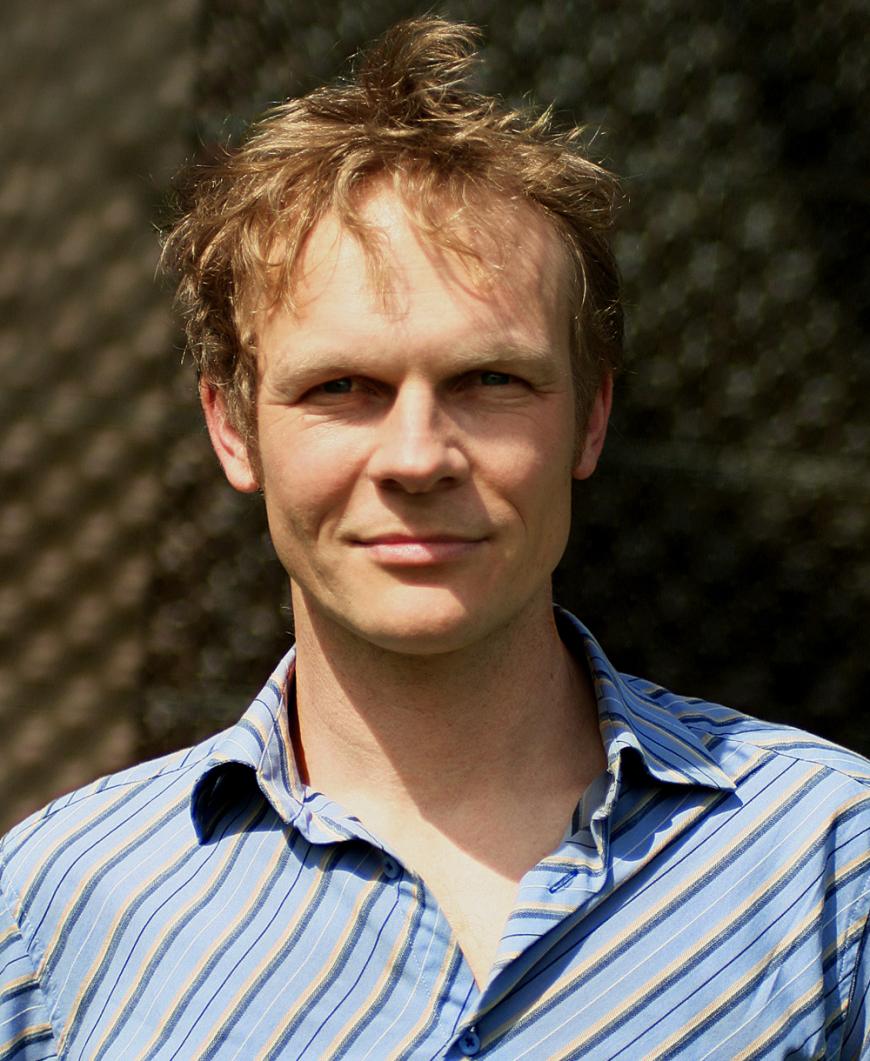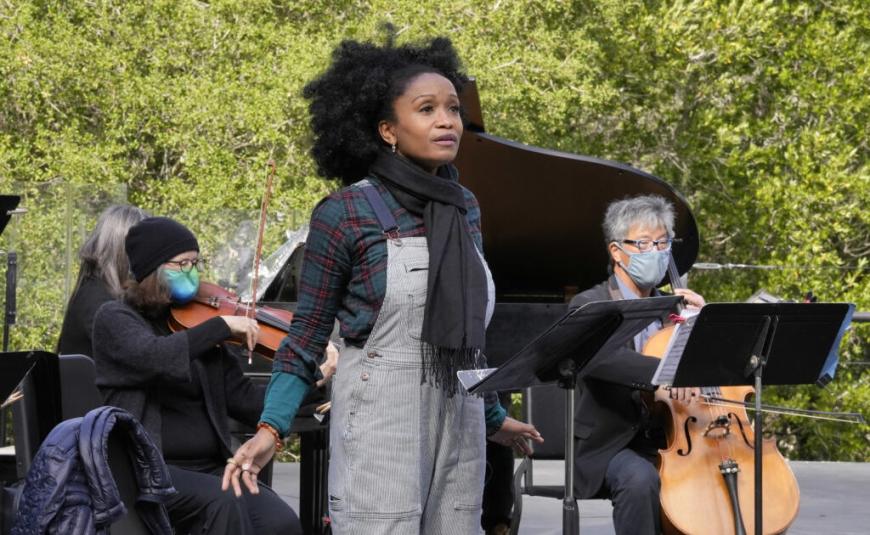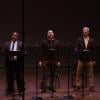
Born in Maryland and raised in Pennsylvania, mezzo-soprano Briana Hunter describes herself as a “100 percent Eastern seaboard kid.” Her grandparents had been part of the Great Migration from the South, so she says she knew about that area of the country as well. But she says she knew nothing about the West Coast.
That’s one reason Hunter agreed to star in Bulrusher, West Edge Opera’s first full-length commissioned opera, which has its world premiere Aug. 3–15 at the Oakland Scottish Rite Center. Bulrusher is composed by Nathaniel Stookey, with a libretto by Stookey and Eisa Davis (who wrote the Pulitzer Prize-nominated play of the same name).
Hunter wanted to broaden her worldview, and she was interested in this story of an 18-year-old mixed-race girl found in a basket in the river as a baby and raised in an all-white small town in Northern California. The girl, Bulrusher, hasn’t seen anyone who looks like her until Hunter’s character, Vera, comes to town.

Hunter says she was moved by Stookey’s response to the characters, who all have rich stories. “You can tell he really loves each of the characters,” she says. “He was there for our first table read, and you could tell how emotional he was. It was very evident how much time he’d spent with them.”
1955 Boonville, the opera’s setting, wasn’t familiar to Hunter, but other parts of the story were, such as the racism and the experience of being the only Black person in a predominantly white area. “I wanted to explore how [racism] applies to specific populations,” she says. “It always manifests differently.”
Davis, a writer, musician, and actor who has worked in film and television as well as in the theater, says she had no plans to make an opera out of her play. In 2008, she met fellow Bay Area native Stookey when she was a soloist in his orchestral song cycle Zipperz at the Oakland Symphony, and he convinced her to do the opera.
“I said, ‘Oh, I have no time. There’s no way.’ And he was like, ‘You won’t have to do anything. I’ll just cut the play down to singable bite-size chunks,’” Davis says. “Then here we are, what, five years later?”
Davis loves language, not a surprising quality in a writer, and she’s particularly interested in languages and dialects that are disappearing. When she was on a family vacation in Mendocino and found a book about Boontling, a language spoken in Boonville from around the 1880s to the 1920s, she was intrigued.
Boontling uses some words from the Pomo language; the Pomo are a Native American tribe from Anderson Valley that now lives around Clear Lake. One of Bulrusher’s characters, Madame, is Pomo. Davis got in touch with Elem Pomo cultural leader Robert Geary to get a translation of a prayer for her play. Geary’s aunt, Loretta Kelsey, is the last fluent speaker of the Elem Xaitsnoo language of the Southeastern Pomo, and the two work together on language revitalization.

Being asked to do the translation surprised Geary. “Something like this had never happened with our community or, I think, any Indigenous community within the area,” he says. “It was pretty interesting to us, and I was like, ‘When we get to the point where [the play is] complete, definitely call us. We’d like to at least go and see it.’”
Stookey invited Geary to see the play in 2023 when it was at Berkeley Repertory Theatre, and Geary went with his wife and three of their children. He saw connections to Pomo cultural traditions in Bulrusher’s character. “It totally resonates with some of our spiritual healers. She’s able to read the water,” he says. “That specifically comes from Elem or Lake County.”
Director NJ Agwuna calls the play lyrical with a “sense of mythos.” She says she’s interested in the small-town setting and the story of a stranger — in this case, Hunter’s character — coming to town.
“Everyone is just doing things in the routine. Everyone has their job, and they’re doing what they need to do to get by,” Agwuna says. “Then the unseasonable rain brings in this other person that kind of unearths things that people were ignoring and trying to hide from.”
The opera expands on the relationships in the play, Agwuna thinks. “This is something that Nat has added to this opera [by] creating a larger community,” she says. “In the play, we only have the principal characters, [but] in this opera, we have this ensemble that gives us a little bit of the subtext.”
The names of the main characters tell you who they are, Agwuna says. In the play, Schoolch, the schoolteacher who raises Bulrusher, has a line about people’s names being their fates, and that’s certainly the case with Madame being a madame, Bulrusher being found in the bushes, and Logger being a logger.

Bass Kenneth Kellogg, who plays Logger, says he’s delighted to be part of a new opera. “It’s very different than doing a piece that’s been done for decades and centuries, where there’s a track record of expectation,” he says while on lunch break from rehearsal. “The excitement for me of doing a new piece is the discovery process, and for world premieres, it’s special. That’s what I love about art and performance — finding a connection that would resonate with an audience.”
Kellogg says the cast experienced that when doing a preview for the members of the Pomo tribe. “Robert came and shared some of his cultural traditions and gave insight to how Madame potentially ended up in this community,” Kellogg says. “It was beautiful to have that connection, and Robert talked about how to finally have [his] community have a voice in opera and onstage is huge.”
Kellogg says he is glad to be able to work on a local narrative. Hunter agrees. “I always love when arts organizations really invest in telling stories that pertain to the communities they’re in,” she says. “I think that’s a big way the arts can make an impact.”




